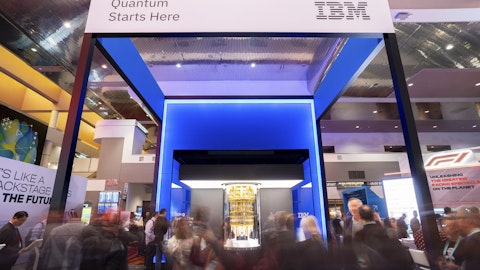Alan Baratz: Yeah. Unfortunately, not really for the following reason, and this is actually an important characteristic of our system. When a problem gets submitted to the system, because of how you program our system, we can’t really tell what the application is that kind of underlies that submission. Just the way the computer gets programmed and the data that ends up getting submitted, it almost kind of inherently obfuscates. And this is actually important because it’s an important privacy and security element of how our system works. So, no, when our customers submit problems, we don’t know what exactly they’re doing. But we have relationships with all those customers, and to the extent that we engage with them on a regular basis, we do try to understand exactly how they’re using our systems.
I will say that the Advantage2 processor is brand new. It’s only been in Leap for a month. And so most of what’s going on in that system right now is evaluating it, so that they can see how much better it is than the previous generation system.
Craig Ellis: Any historic data with prior systems on what the conversion rate is between problem submission, proof of concept work, et cetera, to give us an estimate of what the final might look like after this?
Alan Baratz: Yeah. Because of the fact that when a new generation system comes out, we always put it into our cloud service. And whenever we put something in our cloud service, it’s available to all our customers instantly. Most customers just immediately transition to the new system. So, occasionally, if there’s something that’s up and running, they’ll leave it on the previous generation system. But when it comes to new work, almost immediately transitions to the new system.
Craig Ellis: Yeah. Got it. That’s helpful. Appreciate that. And then the second question was more for John and I wanted to take a swing at following up on one of Quinn’s points on bookings for calendar ’24. So, if we look at the first quarter, we’ve annualized I think around $17.2 million, so up 50% year-on-year. And I’m not looking for guidance, John, because I know the company isn’t providing that. But what I was hoping you could do is just frame, as we look at the year, what would be some of the factors that would drive higher bookings levels, maybe early conversion on Advantage 2, new successes with streamlined go-to-market strategy, et cetera? And are there things we should be mindful of that would be challenges to year-on-year growth, whether there was something unusual that happened last year, et cetera? Thank you.
John Markovich: I think one of the areas that we’re looking at with respect to the bookings momentum Craig is our focus on the verticals and the implementation of that go-to-market program as well as the timing and the magnitude of the applications transitioning into production.
Craig Ellis: Got it. And then lastly, there seems to be a growing Forbes Global 2000 quotient to the customer base. I think we’re about 33% now with the 78% you had last year. Bigger picture, Alan, how does that evolve over time? Are we thinking that that moves up significantly as we go through ’24 and ’25, or what would the pacing for that customer conversion be at that level?
Alan Baratz: So, I think I mentioned a few minutes ago that as we’ve launched the new verticalization at least in the logistics arena, we’ve already seen very strong interest from companies in that vertical, many of them Global 2000 companies or Fortune 500 companies. So, we’re starting to build a really nice pipeline now with companies at that scale that are not currently customers. But obviously, that’s just the very beginning of the process with pipeline building and now we have to go get deals closed.
Craig Ellis: All right. Well, congratulations on a strong start to the year. Thank you.
Alan Baratz: Thank you.
Operator: Thank you. At this time, I would like to turn the call back to Alan Baratz for any additional or closing remarks.
Alan Baratz: Okay. So, first of all, I apologize to all of you for running over today. We’ll try to do a better job of meeting management next time around. But for those of you that stayed with us, thank you. Listen, I couldn’t be more excited by the progress we’re making. It isn’t easy to build an entirely new category, but we’re doing it and we’re leading the way. Our hardware and software are delivering highly performant production scale and commercial grade solutions. Businesses are using our technologies in production to fuel daily operations and reap the tangible benefits quantum can bring. We’re showing the world through our research how quantum can outperform classical, full stop. D-Wave is out in front, blazing the trail for commercialization of quantum. It’s an incredible time for the company, and thank you all for taking the time to join us.
Operator: This does conclude D-Wave’s Q4 2023 earnings call. You may disconnect your line at this time, and have a wonderful day.
Follow D-Wave Quantum Inc. (NYSE:QBTS)
Follow D-Wave Quantum Inc. (NYSE:QBTS)
Receive real-time insider trading and news alerts



